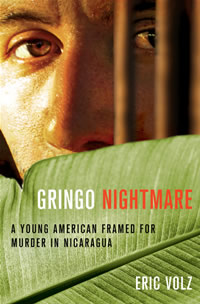Justice Delayed
Framed for murder and left to languish in a Nicaraguan prison, Eric Volz tells his story
In 2006, Eric Volz, a Californian with Nashville ties, was living and working in Managua, Nicaragua. A UC San Diego graduate in Latin American Studies, he was the co-founder of El Puente (“The Bridge”), a magazine dedicated to closing the gap between native Nicaraguans and the increasing number of tourists and entrepreneurs who visit from North America and Europe. Volz and a friend conceived of the magazine in the beach town of San Juan del Sur, where Volz dated the town beauty, Doris Jiménez. As its readership grew, the romance fizzled, and Volz relocated to more urban Managua. There, he received a phone call. Doris had been brutally raped and murdered. In the days that followed, Volz went from grieving ex-suitor to the prime suspect in Jiménez’s death. His trial and yearlong incarceration is a horror story of trumped-up charges, judicial corruption, and political intrigue. In his new memoir, Gringo Nightmare, his release is a tale of hope.
 During the 2000s, change came rapidly to Latin American coastal towns like San Juan del Sur, and Eric Volz was ahead of the curve. With millions of potential retirees looking for an unspoiled oceanfront view, developers and opportunists flocked to the area, and real-estate values multiplied with no end in sight. Volz hoped his background in Latin American studies and his fondness for indigenous cultures might provide an opportunity as the sleepy seaside community sought to integrate the new arrivals. At first, El Puente, which he founded with friend John “JT” Thompson, stuck to its local, egalitarian principles. Gradually, however, the publication’s readership expanded beyond Nicaraguan borders, and it became increasingly weighted toward development and economic opportunity. Volz had himself been hired by real estate firm Century 21, which was one of the first American firms to get in on the Nicaraguan coastal boom.
During the 2000s, change came rapidly to Latin American coastal towns like San Juan del Sur, and Eric Volz was ahead of the curve. With millions of potential retirees looking for an unspoiled oceanfront view, developers and opportunists flocked to the area, and real-estate values multiplied with no end in sight. Volz hoped his background in Latin American studies and his fondness for indigenous cultures might provide an opportunity as the sleepy seaside community sought to integrate the new arrivals. At first, El Puente, which he founded with friend John “JT” Thompson, stuck to its local, egalitarian principles. Gradually, however, the publication’s readership expanded beyond Nicaraguan borders, and it became increasingly weighted toward development and economic opportunity. Volz had himself been hired by real estate firm Century 21, which was one of the first American firms to get in on the Nicaraguan coastal boom.
With Doris Jiménez’s murder, Volz’s burgeoning career skidded to a halt. Though he was in Managua an hour away from San Juan at the time of the murder, likely suspects were overlooked, and Volz was hastened to trial. Despite an airtight alibi, he was convicted and sentenced to thirty years, Nicaragua’s maximum. Incarcerated in some of that country’s harshest penal institutions—including the dreaded La Modelo, which counted among its inmates Contra rebels and political prisoners—Volz was forced to endure unimaginable hardships and cruelty.
The majority of Gringo Nightmare‘s pages are devoted to Volz’s struggle to survive prison and his supporters’ struggle to free him. As hard as he fought for freedom, Nicaragua’s Sandinista government fought equally hard to maintain his guilt. The reasons for this persecution remain sketchy, though Volz believes he was a political prisoner. The Nicaraguan government was in intense negotiations with the Bush administration over the destruction of a cache of SAM-7 missiles. In the wake of 9/11, these shoulder-borne surface-to-air-weapons were seen as potential tools for terrorism. Nicaraguan president Daniel Ortega wanted cash, and Volz believes he was a bargaining chip during the negotiations. In addition, the other prime suspect in the case, Armando Llamas, had political connections that meant he was almost immediately exonerated. It appears Volz was set up.
 In passionate, clear prose—relying on a journal he kept in prison—Volz describes the horrors of his incarceration. “The air in the prison felt like a thick, wet, ferociously hot blanket of air and insects,” he writes. “Moisture settled on every surface, and any place you put your body quickly became a nasty puddle of stinking sweat, a breeding ground that ensured the cycle of filth and infestation never ended.”
In passionate, clear prose—relying on a journal he kept in prison—Volz describes the horrors of his incarceration. “The air in the prison felt like a thick, wet, ferociously hot blanket of air and insects,” he writes. “Moisture settled on every surface, and any place you put your body quickly became a nasty puddle of stinking sweat, a breeding ground that ensured the cycle of filth and infestation never ended.”
In this nightmarish setting, Volz struggles to make sense of his predicament, as he lays out the intricate political wrangling that led to his eventual release. Among his many supporters—which include his mother Maggie, former Nicaraguan President (and Sandinista foe) Arnoldo Alemán, and former U.S Secretary of State Condoleezza Rice—ex-CIA operative Bob Lady proves the most valuable. With a gambler’s ability to bluff and parry and a bottomless knowledge of regional politics, “Tio” Bob, as he’s known, eventually leads both governments to believe that Volz’s continued internment is in neither country’s best interest.
Despite this compelling account of injustice, Eric Volz doesn’t emerge from Gringo Nightmare as an entirely sympathetic character. By Nicaraguan standards, he is an extremely wealthy man. Photos convey a self-assured, almost cocky personality that, in a climate of rampant development, might have rubbed certain people the wrong way. But being annoying doesn’t equal being a murderer, of course, and there’s no doubting that Eric Volz suffered immeasurably at the hands of unprincipled string-pullers both at home and in Latin America. More than anything, Volz’s spiritual insights do much to counteract what might otherwise seem like a tragedy born of a Yankee sense of entitlement. “My life was still about building bridges,” he writes, “but not just bridges between people and resources or between one culture and another but between the madness of the fallen world we inhabit and the inheritance of an eternal kingdom. What had been missing all along in my life was the quest for holiness.”
Eric Volz discusses and signs Gringo Nightmare at 7 p.m. on May 5 at Davis-Kidd Booksellers in Nashville.


